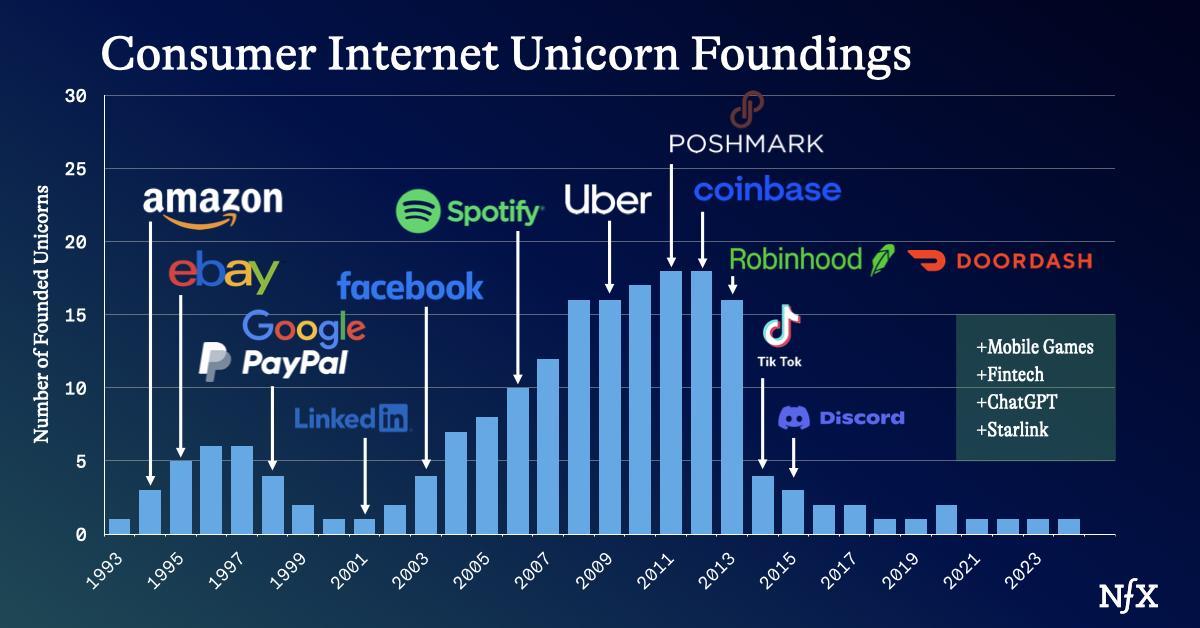Development of AI agents is going to fundamentally transform how we work, and what startups are going to look like.
I’ve started seeing this transformation first-hand. In the past year, the number of AI agent-based startups I saw skyrocketed from single digits to dozens each month.
In Israel, we’re witnessing a surge of startups building AI agents, with a strong emphasis on enabling others to integrate and customize these agents for diverse use cases. Many of these companies are leveraging Israel’s strengths in cybersecurity, data science, and enterprise software to create agents that tackle vertical challenges like healthcare diagnostics and predictive security. But we’re also seeing as horizontal applications like workflow automation and personalized customer engagement as well.
As we begin to review more of these AI-agent led startups, we’re noticing that they are following certain patterns. What began as startups aided by generalist AI is transforming into a full “AI-first organization.”
With each major advancement in the AI agent space, we get closer and closer to the trend we began predicting several years ago: “The Three Person Unicorn” –– a company largely run on AI autopilot, with humans making only critical strategy setting decisions.
This momentum has been building for several years. But this feels like a tipping point. Sam Altman has predicted that this will be the year AI agents truly join the workforce. By 2027, at least half of companies will have launched some form of agentic AI. And that’s just the starting point.
Soon, we may see an entire economy made up of these AI-first organizations (it’s already happening, for those paying close attention).
If you want to build a company that truly lasts, you have to see where this is going. You are going to be hiring AI agents, building with AI agents, and competing against them.
Here’s what’s coming:
The 5-Level Evolution of AI Agents
I like to think of the AI agent space as a series of building blocks, with AI becoming more autonomous at every level.
I’ve seen companies succeed at each level of this pyramid…each with a unique value proposition and market characteristics that make it a good fit. But ultimately, everything is going to shift towards the autonomous levels of the pyramid: agents, innovators, and AI-first organizations.
Another way to look at this is a larger shift from co-pilots to agentic “auto-pilots.” We’re moving from chat-based systems where the humans take action, to agents where humans direct and oversee that action.
If you are still operating at a chat level or co-pilot level, you are going to be competing with fully autonomous agents in your space very soon.
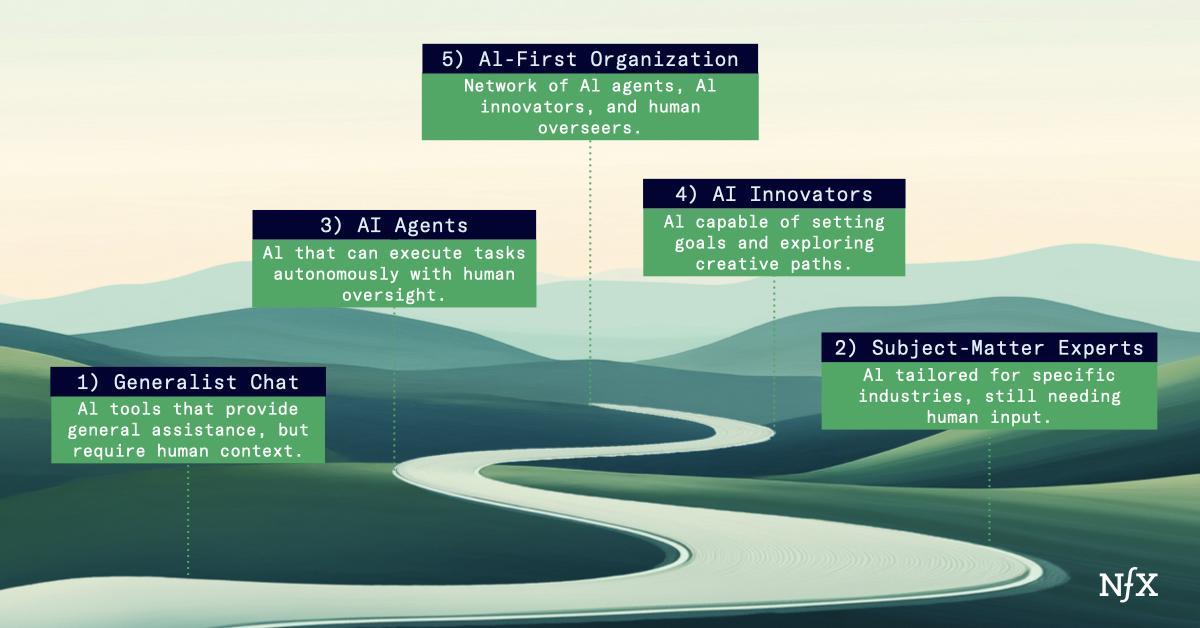

Where We Started: Generalist Chat
The first wave of AI collaborators were the foundational models (generalist LLMs like ChatGPT or Claude). They were generalists. They acted as the breakthrough UX that helped us understand what AI was broadly capable of.
However, AI was just another tool – albeit an extremely powerful one.
Humans still led the way when it came to imbuing AI with context, reason, and empathy. It was just a matter of teaching AI to create things of value. Think of “prompt engineering” as the first baby steps in that direction –– teaching a generalist tool to create a specific outcome.
As early adopters soon learned, these generalist tools are masters of none.
Which shifted the AI startup landscape toward its first evolutionary stage.
Level 2: Subject-Matter Experts
Generalist AI can, read, write, and perform tasks given the correct guideposts. But generalist AI tools still don’t perform well in hyper-specific industry contexts.
Soon after the rise of generalist AI, we began to see the emergence of true AI subject matter “experts.” AI that could appear to solve problems without excessive prompting from a person. Chat was still the major interface for these systems, but many companies have built additional industry-specific functionality on top of that chat function.
A natural fit for these subject-matter experts was legal. Companies like EvenUp, and Darrow, all showcased the power of AI trained on a specific corpus of legal data. This was AI that understood your world: enough to recognize the nuances of legal language, and generate professional-quality materials out-of-the-box.
They were far better solutions compared to generalist tools –– a pattern that holds outside of the legal field as well (see our thoughts in The Verticalization of Everything).
Level 3: Agents (We are Here)
There are still a number of great companies operating at the subject matter expert level of AI. But in the last year or so, I’ve noticed a distinct shift from chat-based value propositions to action-based value propositions.
Generalist AI tools and subject matter experts were true “co-pilots.” They could create new connections, generate writing, or surface new material. But humans still needed to take action to make those tools truly useful.
Beginning in April 2023, we began to see evidence that AI could execute these lists of tasks. The most famous examples of AI agents were in the code generation space, like Open AI’s code interpreter, or Cognition’s Devin.
But this concept has already expanded far beyond code generation into more complete “job descriptions.” There’s a growing landscape of AI agents all aimed at executing specific tasks. There is massive potential for packaging these tasks together into true services.
For example, NFX-backed Enso is pioneering an AI agents marketplace for SMBs – a class of companies we believe will be early adopters in this space.
The big change to note: the brain isn’t enough anymore…you need the action. It’s the beginning of the end of the co-pilot era.
Today, we are somewhere in between the co-pilot model dominated by Generalist AI systems and subject-matter experts, and true “autopilot” systems.
Once we refine AI’s ability to complete tasks, and take action without intensive human supervision, we are never going back.
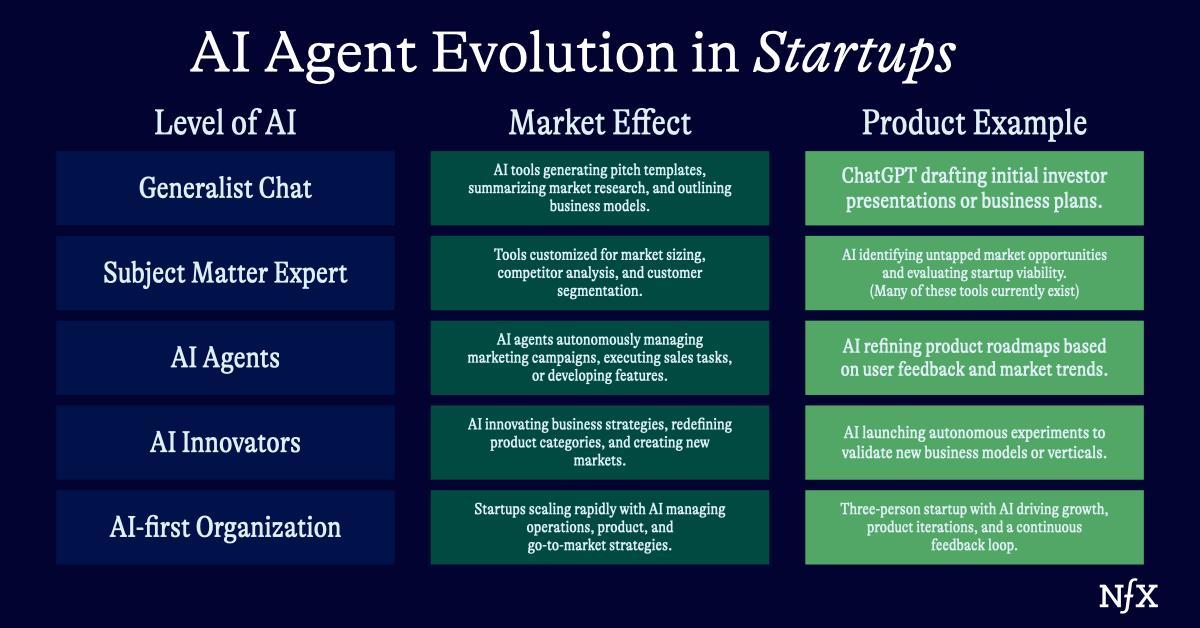
 Example of how the evolution of AI agents will play out for startups. As you build your product, be aware that you can’t be stuck at one evolutionary level for long –– competition is moving toward level 5.
Example of how the evolution of AI agents will play out for startups. As you build your product, be aware that you can’t be stuck at one evolutionary level for long –– competition is moving toward level 5.
Level 4: AI Agent Innovators
Once AI agents are able to consistently execute tasks, we will soon see agents with the capacity to innovate!
This is when things really get interesting.
There’s a whole new level of value to unlock if we allow AI to generate and explore new intellectual directions.
You could think of this the same way we think about the human brain’s approach to problem solving and creativity.
We have our task-oriented “if-then” brains that help us execute tasks and solve problems. But we also have an active subconscious. The type of thinking that is kicked into gear when you’re not working on a problem, but are taking a shower, or going for a walk.
Have you ever struggled to write or solve a problem, walked away, and then solved it later with ease? This is the result of your subconscious exploring new, creative approaches without restraint. It’s the state in which most new, creative ideas appear.
AI Innovation agents will be capable of this type of subconscious exploration. They won’t be bound by “if-then” statements that create narrow thinking.
You could imagine asking a team of AI agents to develop a software feature on Monday, and checking back on Wednesday to find that the agent has developed something like what you asked, but enhanced it based on their experience of trial and error, and analysis of the market.
The ability to chart a path toward a goal when the goal itself is more abstract (increase sales, increase the performance of my software, make people love my app) will be key for the next level of AI agent development. It is a major factor that will allow AI agents to truly become fully developed workforces.
Pure automation without critical thinking is a salve for the lowest hanging fruit of the economy. But it’s not the answer to the biggest, most valuable questions. Creativity is.
A key unlock here will be trust. We need to have full confidence in AI agents to take our eyes off the ball, and let them make strategic decisions, not just task-oriented ones.
Some of this trust must be built with technology. We’re going to need two things: explainability and infrastructure. Each may even become industries in and of themselves. For example, NFX-backed Maisa is refining “proof of work” for AI agents, a key element of building trust in the agent ecosystem as a whole. (More to come on this soon).
Another NFX investment, Emcie, is developing the infrastructure needed to create hyper-specific AI agents for individuals and enterprises.
Some of this trust will develop culturally. The more we see AI making intelligent decisions and creating better outcomes, the faster this future will arrive.
The early adopter communities will be key. SMBs or companies that simply don’t have the option of hiring human workforces to meet their needs will take the first steps –– and the rest of the ecosystem will watch and follow.
It will touch all sectors.
Just for an example, education :
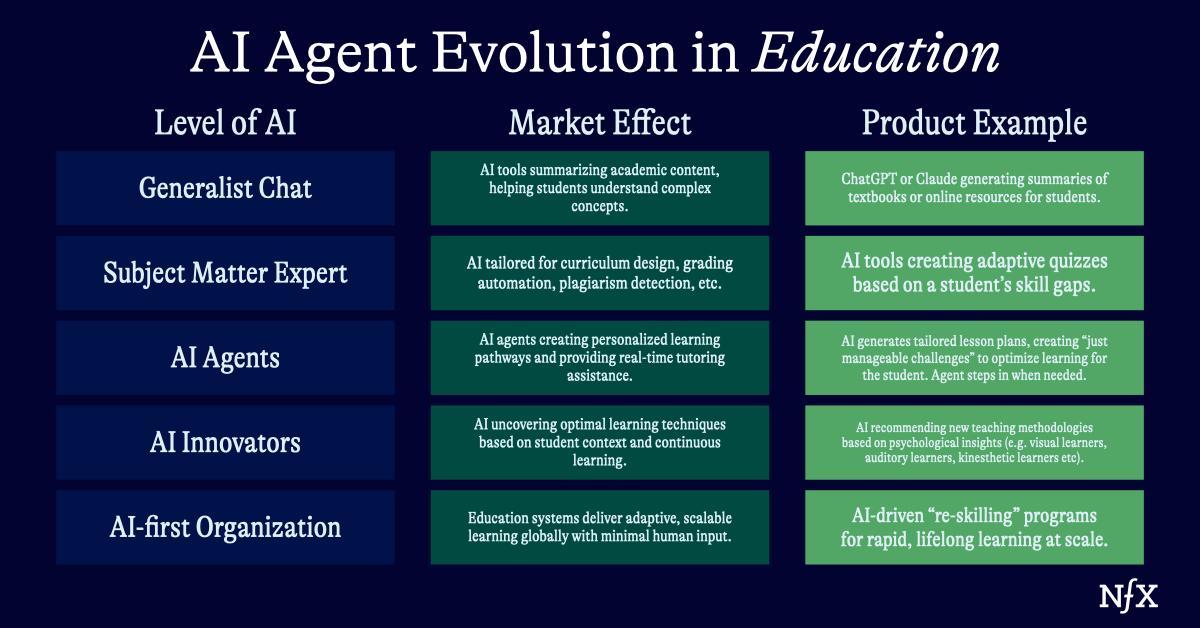
 Example of how the evolution of AI agents will play out in the education sector.
Example of how the evolution of AI agents will play out in the education sector.
Level 5: AI-First Organizations
With agentic AI workers, AI innovations and systems of trust and explainability in place, we’ll eventually see the rise of true AI organizations. These are collections of AI agents, and AI innovators that are capable of wide-ranging action.
This is the level of AI we’re used to hearing about in Sci-Fi. It’s the AI you can read about in Daniel Suarez’s Daemon, at worst, or Naomi Kritzer’s Better Living Through Algorithms at best.
These agents can handle decision-making in complex environments where there are many potential goals worth achieving. The difference here is that the AI itself will be capable of self-selecting which goals are optimal and designing a path to get there.
AI will take most of the action, you’ll work alongside the AI to review and vet the course it takes.
We predicted this several years ago in our “The Rise of the Three Person Unicorn.” But now we’re beginning to see what the adoption curve looks like in more detail.
You could imagine self governing supply chains that oversee the entire process from production to delivery. Automated trading firms in finance made up of many AI agents (we’re already starting to see AI-centric hedge funds develop). Startups where AI could generate an idea, develop the necessary code, iterate and test until achieving outstanding results, and execute a pivot if necessary.
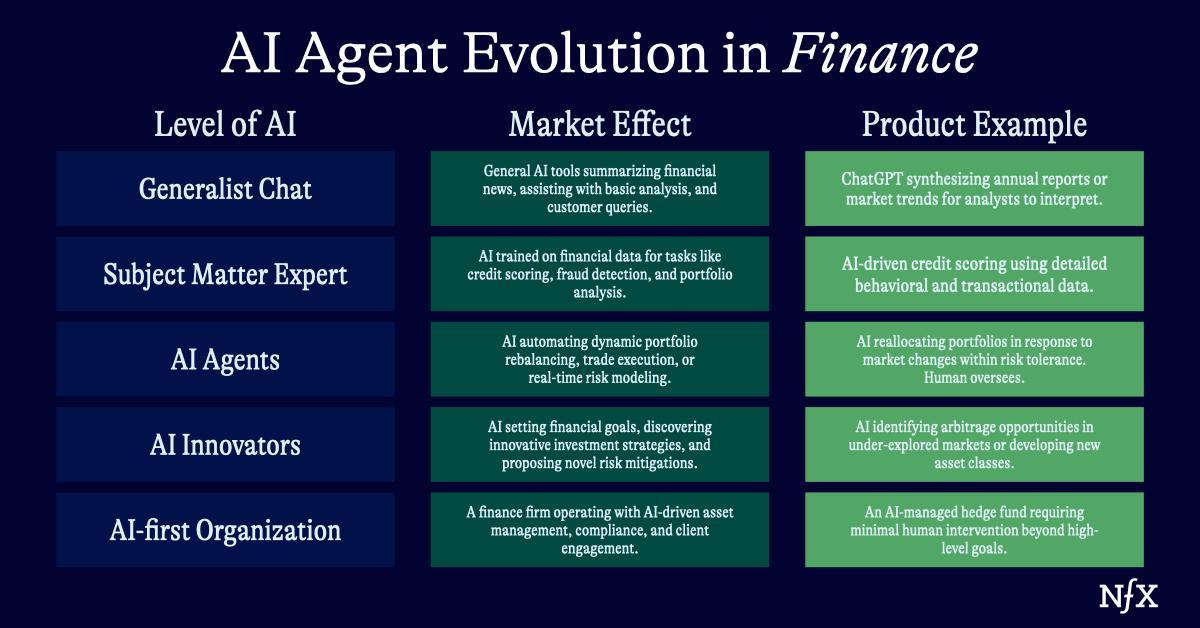
 Example of how the evolution of AI Agents could play out in finance sector.
Example of how the evolution of AI Agents could play out in finance sector.
We don’t expect this to unfold right away. It’ll happen in steps.
AI will begin to take on increasingly large tasks as trust and technology both develop. We’re actually quite early in the technology window for Agentic AI systems. The people who really get this are still the builders and hobbyists who have their nose to the ground.
But soon, an AI-dominant organization will emerge. We’ll have a “ChatGPT” moment –– a moment when a single impressive product encapsulates what a new technology breakthrough is really capable of. Before ChatGPT, how many people really grasped what AI could do?
If you know where we’re going, you’re going to be a step ahead.
You’re going to be operating in an economy with as many AI organizations as human ones (if not more). Be ready for it.
The AI Agent Economy: Where Do You Fit?
The key to leading through these changes is knowing where you and your company fit in.
In Israel, the AI agent market is thriving, with startups leveraging local expertise in machine learning, cybersecurity, and automation. While we see a growing number of companies building foundational agent platforms that others can customize, like Enso, I believe Israel’s core advantage will be in excelling at specialized applications—and there are many to be built.
Startups here are already addressing vertical challenges in areas like fintech, logistics, and healthcare, positioning themselves as key contributors to the rapidly evolving AI ecosystem.
AI agents are coming. AI innovators are coming. AI organizations are coming.
So ask yourself now, what barriers are keeping those things from entering my space right now? Can I remove them? Or, how will I be the major beneficiary once they are removed?
Not every company should focus on building AI agent infrastructure or explainability. But you can understand how the overall economics of your space will shift when we have these new labor pools unlocked.
You can understand how this will affect your teams psychologically -– what will it be like when some people only manage AI workers? Or, consider the flipside: when humans are managed by AI?
At NFX, we make it our job to study how transformative technologies work. You can start here. There’s a timing to these shifts. Certain skills that become emphasized and de-emphasized as technologies change. There are psychological changes to navigate. And new unpredictable opportunities are created.
AI agents are at their most exciting and nascent stages. This is the moment when great companies get built. We expect, and are excited to support more entrepreneurs in this space in the next few years.
We’ll be writing much more about this in the next few months. We’re going on this journey with you.
As Founders ourselves, we respect your time. That’s why we built BriefLink, a new software tool that minimizes the upfront time of getting the VC meeting. Simply tell us about your company in 9 easy questions, and you’ll hear from us if it’s a fit.



